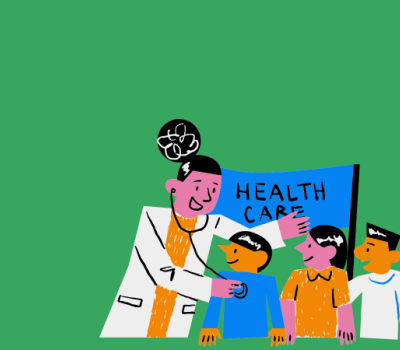When Cuts Don’t Heal
As the 119th Congress begins its new term, proposed cuts to Medicaid are once again a major point of discussion at the federal level. Republicans in Congress are preparing to introduce sweeping budget and policy changes through the budget reconciliation process that could drastically affect public assistance programs, including Medicaid.
In Utah, Medicaid provides essential healthcare to hundreds of thousands of residents—and half of them are children.
The House Budget Committee’s budget resolution proposes at least $1.5 trillion in cuts, with the Energy & Commerce Committee (which oversees Medicaid) tasked with generating a minimum of $880 billion in reductions over the next decade, along with additional changes to the program.
Since the Energy & Commerce Committee has limited jurisdiction over other mandatory spending programs, it’s reasonable to expect that the majority, if not all, of these cuts will come from Medicaid. For now, the bill only needs a simple majority to pass the House. However, once it reaches the Senate, reconciliation allows it to bypass the traditional 60-vote threshold and pass with a simple majority.
House GOP Passes Budget Resolution: What Happens Now?
On the evening of February 25th, the U.S. House of Representatives narrowly passed the budget resolution with a 217-215 vote. All but one Republican—Rep. Thomas Massie of Kentucky, who voted against the measure—supported the resolution, including all four of Utah's representatives. The plan proposes slashing billions in federal spending, with $880 billion in cuts over the next decade, primarily targeting Medicaid and SNAP.
With both chambers having now passed their respective budget resolutions, GOP leaders must reconcile their differences to craft a unified version before committees can draft a final legislative package. It is critical that any final budget resolution rejects the House's proposed cuts to Medicaid and SNAP.
Continue to call and email your members of Congress today. Urge them to protect these essential programs from harmful budget cuts.
Proposed Changes
Earlier and recent proposals aim to restructure Medicaid’s funding structure.
Currently, Medicaid is jointly funded by both the federal and state governments, with each state’s funding determined by the Federal Medical Assistance Percentage (FMAP). FMAP represents the share of Medicaid costs covered by the federal government. For FY 2026, Utah’s FMAP is set at 62.46%, meaning that for every $1.00 Utah spends on Medicaid, the federal government contributes $1.66.
Proposals to shift Medicaid financing to block grants or per capita caps raise serious concerns.
Block grants provide a fixed amount of federal funding, regardless of enrollment growth or increased needs. Block grants and per capita caps could stop Utah from getting more federal support in the face of a crisis, like a natural disaster, economic downturn, or another public health emergency, when more people tend to apply for Medicaid in the face of job loss or other temporary hardship.
If enacted, these changes to Medicaid's financing structure would force states to:
- Cut Eligibility and Benefits: States may have to reduce coverage for groups like children with special health needs, adults over 65 in long-term care, and people with disabilities.
- Shift Costs to Families: Families would face higher premiums and reduced benefits.
- Reduce Provider Payments: States could lower reimbursement rates for healthcare providers, leading to fewer participating doctors and hospitals.
- Limit State Flexibility: States may lose the ability to customize Medicaid programs to meet local needs, leading to a one-size-fits-all approach that may not address specific population needs.
Additional proposals in the House Budget Resolution include:
Eliminating the enhanced matching rate for the Medicaid expansion
The federal match rate for Medicaid expansion rests at a 90 percent match. This proposal would eliminate the enhanced match and instead drop it down to the States regular matching rate, in this case, 62 percent. Such a dramatic drop would increase costs for the state. In 2019, Utah passed SB 96 that created a "trigger law", noting that if the federal government were to ever go below a 90 percent drop, the State would have to begin to wind down or completely remove Medicaid expansion. This means over 75,000 Utahns could immediately lose coverage to life saving care, services, and prescriptions. The rise in the number of uninsured people would lead to more uncompensated care, hurting health care providers as well as state and local budgets.
Mandating Work Requirements
Mandating work requirements does nothing to foster economic mobility but rather imposes additional red tape. The majority of Utahns on Medicaid are already working or unable to work. Evidence from other states is clear: work requirements create administrative and system barriers, causing eligible people to lose their Medicaid coverage.
Eliminating Medicaid and CHIP eligibility for certain immigrants
Certain lawfully residing immigrants are eligible for Marketplace insurance under the Affordable Care Act and Medicaid/CHIP. Depending on one's immigration status, they may be subject to a five-year waiting period before being able to access public assistance programs, but states have the option to waive it for fully present children and or pregnant women. This proposed provision threatens the ability of some of the most vulnerable to keep and access coverage, leaving millions without necessary services.
What does this mean for Utahns?
Federal Medicaid cuts would increase healthcare costs for Utahns and leave many without coverage.
When families lose Medicaid, they lose financial protection and access to care. Cuts to Medicaid and changes to its current financing structure would put the state in a financial bind, forcing difficult decisions about whom to cover and what services to provide.

In Utah, Medicaid is a vital safety net for families, covering 1 in 6 children and approximately 17% of all births.
Medicaid does far more than provide basic health coverage—it builds a foundation for lifelong health and development.
For example, Early and Periodic Screening, Diagnostic, and Treatment (EPSDT) is a hallmark of the Medicaid program. It guarantees that children receive the care they need at every stage of development, preventing long-term health complications and promoting readiness for school and beyond.
EPSDT services are available at no cost to Medicaid members from birth through the end of the month in which their 21st birthday occurs. Benefits include well-child check-ups performed throughout a child’s development that include services such as preventative physical exams, hearing and vision screenings, mental health care, and access to all necessary immunizations. If there are additional medical concerns, EPSDT works with the doctor to ensure the child is given appropriate and necessary care. EPSDT dental provides preventive and restorative dental care.
Medicaid ensures children receive regular doctor visits, immunizations, and screenings.
These early interventions help detect health issues before they become severe, fostering better long-term outcomes. Preventive care doesn’t just save lives; it reduces costs by addressing health concerns before they escalate.
Medicaid doesn’t stop at primary care.
It includes dental, vision, and hearing care, as well as access to life-saving prescriptions and medically necessary treatments. For families in rural Utah, where healthcare access can be sparse, this coverage is indispensable. For example, San Juan County accounts for just 1.1% of Utah’s total Medicaid enrollment, yet 30% of its residents—1 in 3 people—rely on Medicaid as their primary insurance.
For children with developmental needs, Medicaid provides unlimited speech, physical, and occupational therapy, mental health services, and autism support. These resources help children overcome challenges and achieve their full potential, offering hope and opportunity to families navigating complex care needs.

Why Utah's Rural Communities Cant Afford Federal Cuts
If Congress follows through with these drastic Medicaid cuts, small towns and rural communities across Utah will lose a vital lifeline to health care. Medicaid, jointly financed by federal and state funds, would suffer a loss of millions in federal funding, crippling Utah’s budget and sending shockwaves through the state’s health care system.
A new report by the Georgetown University Center for Children and Families (CCF) highlights the essential role Medicaid plays in Utah’s small towns and rural communities. The report reveals that Medicaid provides health coverage for:
- 20.8% of children living in rural areas or small towns, compared to 17.7% of children in metro areas.
- 11.1% of rural adults, compared to 8.6% of adults in urban areas.
- 11.8% of seniors in rural areas, compared to 11.7% in urban areas.
These numbers underscore the vital role Medicaid plays for rural Utah families. If Congress enacts sweeping Medicaid cuts, the impact will be devastating—especially for rural communities.
Who’s Really Impacted by Medicaid Cuts?
When policymakers talk about cutting Medicaid, they often claim to target inefficiencies or fraud in the program, but in reality, these cuts hit the most vulnerable in our state, including:
- Children who rely on Medicaid for preventive care.
- Families caring for medically complex children who depend on waivers and specialized services to avoid institutional care.
- Seniors and People with Disabilities who risk losing long-term care and support for nursing home stays.
- Pregnant Women who may miss prenatal and postpartum care, increasing health risks.
- Low-income Families who rely on Medicaid for basic healthcare, including check-ups, vaccinations, and treatments.
- Rural Communities that may face clinic and hospital closures, reducing access to care.
- Small Business Employees who could lose affordable insurance, creating hiring and retention challenges for employers.
- Hospitals that could face disruption in operations, staff shortages, and reduced services.
- And more.
These cuts are not just about budget savings; they have real consequences for those who need Medicaid the most. Without the vital funding that Medicaid brings, we’ll see increased healthcare costs for all Utah taxpayers and enormous, unsustainable pressure on our state budget and communities' ability to access care.
For Utah’s children, people with disabilities, and others relying on Medicaid, the stakes couldn’t be higher. These programs are not optional—they are essential for ensuring health, dignity, and opportunity for our most vulnerable neighbors. It’s critical to protect Medicaid from cuts that would dismantle the care and support these communities depend on.
Call Your U.S. House Representative Today
Now is the time to make sure key Republicans whose votes are needed to pass this budget know how harmful those cuts would be for families in your communities and state, and we need your help!
CALL or EMAIL your member of Congress and ask them to oppose cuts to Medicaid, SNAP and the House Budget Resolution before the potential budget vote.
- Call 1-866-426-2631 and follow the instructions. After inputting your zip code, followed by a #, you will be directed to your House Representative. Legislative aides count the number of calls and issues that come in. It can be a short and concise message!
- Email your legislator and let them know the value of Medicaid and SNAP in your community. You can find data on Medicaid enrollment by Congressional district on CBPP’s data dashboard.












